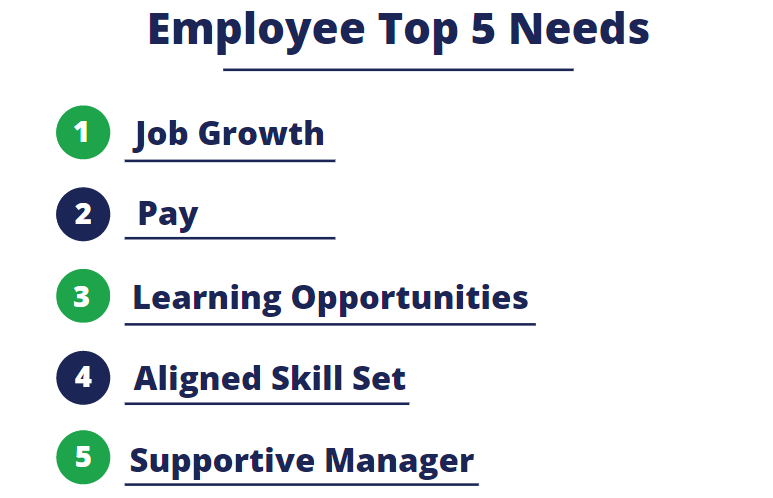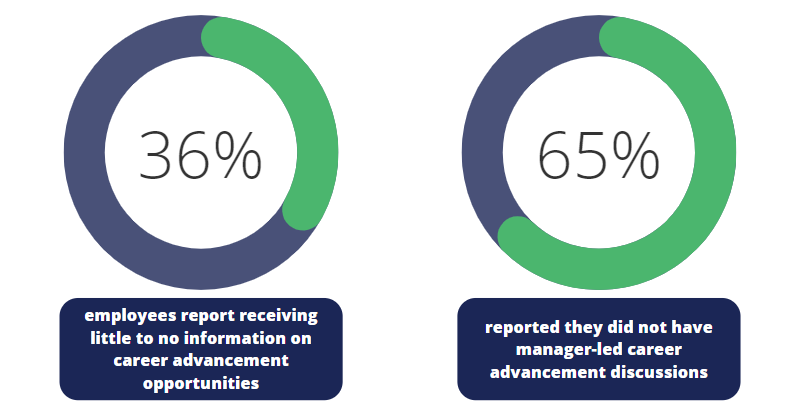This article is an executive summary of the July 2022 article by McKinsey & Company, entitled “Bridging the advancement gap: What frontline employees want – and what employers think they want.” This article focuses on surveyed responses from frontline associates, their barriers to advancement, and perceptions of employers. Our next article will be part 2 to this article, and will take the viewpoint of employers instead of associates. It will summarize how employers can bridge differences between what they think frontline workers want and what actual data says, plus suggest tactical actions to meaningfully improve career advancement outcomes.
_________________________________________
Millions of U.S. workers are considered frontline employees, with jobs in retail, as nursing aides, customer service, administrative assistants, housekeeping/environmental, and similar roles. These frontline associates experience barriers to career growth. If employers can offer better opportunities for career advancement and help raise skill levels, it would benefit employers, plus give a boost to corporate inclusion initiatives.
Recent McKinsey research indicates these workers are more ambitious than we may think. There is a business case for U.S. employers to harness untapped labor power, at a time when the labor force is tightening. This talent pool makes up a large part of the labor force, yet there has been little quantitative research on career advancement needs of lower wage employees. There are differences between what frontline employees want, and what employers perceive that they want.
Growth & Learning Opportunities – More Important than You may Think

When frontline employees were asked what their “top five” needs were, job growth was #1 and learning opportunity was cited as #3. (see Exh. 2 on page 5 of this report). Rounding out the top 5 were pay (#2), aligned skill set (#4), and supportive manager (#5). Many employer HR teams cited that employer recognition, vacation/schedule issues, and job security might have been higher on the list; however, these all were in the bottom half. Employers tended to put a premium on the more intangible benefits but these were less relevant drivers among lower paid associates.
Lower paid workers are highly interested in finding a job profile that meets their needs. (see our related article, “Leverage and Communicate Career Pathways to Recruit & Retain Frontline Workers”) Because most frontline employees cite that they would rather stay and grow with their current employer than pursue external roles, employers that can align job profiles with their employees’ career advancement needs are able to retain a greater share of associates. (see Ex. 3 on page 7) For lower paid non-clinical associates working in U.S. health systems, the absolute top-ranked career attribute is having a job in line with employee skills. This differs from other sectors. For example, job security is noted as the #1 career attribute for manufacturing employees, and job growth potential is #1 for retail workers. So U.S. health systems should be focused on using different career paths available and aligning employee skills to find the best role.
Also in the health field, frontline non-clinical associates report low levels of information about career advancement opportunity. Thirty six percent of these employees say they receive little or no information on career advancement opportunities, which is the worst of any surveyed industry. Some of this could just be because there are so many horizontal roles and opportunity in a health system, its just a lot to process. But it suggests that career growth isn’t being discussed during the interview process, at 1x1s with managers, or through formal and informal communications at hospitals.
Hospitals aren’t on their own when it comes to help with job placements and associates navigating the system to find the right role. There are pre-built tools which can help healthcare organizations to retain frontline non-clinical associates by matching up associates to desired job profiles and learning needs. Catalyst Learning’s CareerCare for example is a 4-step system for career planning that is available to HR teams in healthcare. It matches employees’ interests and skills with in-demand roles. It helps instill knowledge and confidence, and it helps associates see the connection between post-secondary education, higher wages, and upward mobility. Our customers use CareerCare to build awareness of healthcare careers available to their frontline workers. CareerCare helps associates “own” their career, and supports reskilling, upskilling, retaining, and redeploying loyal and motivated employees.
What Barriers do Associates Face?

The 2022 McKinsey study found that more than 70% of frontline associates had applied for advancement opportunities. This shows associated are motivated. However only 40% achieved any raise or incremental responsibility, and <25% had received a promotion.
Employees who do advance report having strong levels of support from their managers and are more likely to have frequent manager-led career advancement discussions. (Exhibit 5 on page 11) sixty five percent of associates surveyed did not receive these types of conversations with employers though, not surprisingly, were the ones less likely to advance. This all shows that the first barrier that associates face is a knowledge barrier, and possible lack of manager support.
Frontline employees also cite a lack of employer-provided development opportunities as a primary barrier to possible advancement. In healthcare, proper credentials are more essential than other sectors (e.g., manufacturing, retail, hospitality.) But with better L&D opportunities, skill placement tests, and better conversations with direct managers, associates can gain the confidence and motivation needed to consider high demand allied health roles, like Radiological Tech, Lab Technicians, or Surgical Techs.
In conclusion, employers should not assume that their optimistic career resource perceptions are shared by their associates, especially in healthcare (Industry specific advancement chart on page 8). When surveyed, employers believed that associates have much more information on careers and advancement than employees cite themselves as having. There is a disconnect between what HR teams think that associates know, and what employees actually know. By their own admission, employers seldom highlight opportunities for advancement through formal channels such as HR, company websites, or job descriptions. Most employees find out about advancement and L&D opportunities through informal communications with supervisors or coworkers. (Exh. 6 on page 12). There is an advancement gap to bridge, between what frontline employees want and know, and what employers think they want and know.
Stay tuned for part 2 of this executive summary, and see a potential road ahead for employers.
Citations
“Bridging the advancement gap: What frontline employees want – and what employers think they want.” McKinsey & Company, July 2022. By Swathi Bhaskaran, Andrew Davis, Christophe Desbriere, and Sara Wasserteil – This white paper was done in collaboration with Cara Plus, and the study itself was titled “McKinsey and Cara Plus Frontline Employee Survey.”
